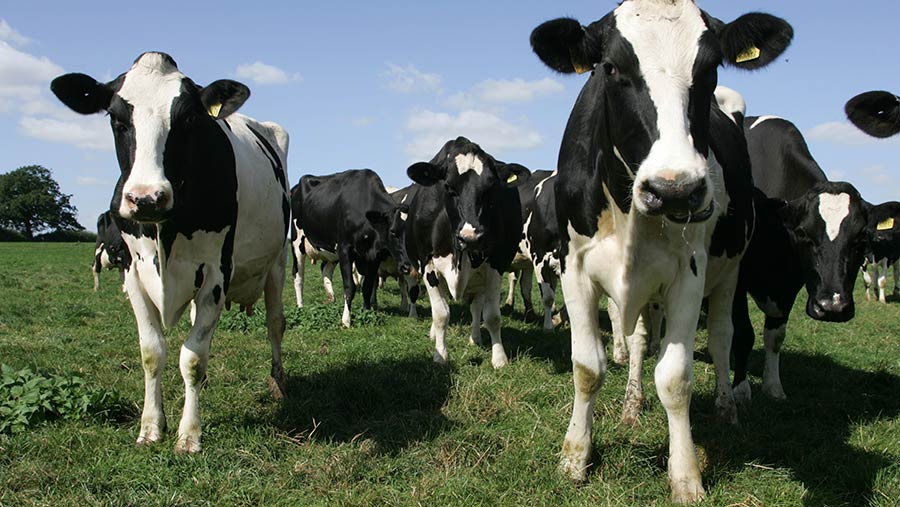Cow-only approach to TB ‘doomed to failure’, warns top vet
 © Tim Scrivener
© Tim Scrivener A veterinary expert has warned Defra that a “blinkered, cow-only approach” to eradicating bovine TB, without bearing down on the disease in wildlife, is doomed to failure.
Defra announced a “major breakthrough” last week in its 20-year pursuit of a cattle vaccine when it revealed that world-leading field trials would soon get under way in England and Wales.
But Cheshire-based TB veterinary expert Den Leonard said Defra’s approach would ultimately fail if it stopped controlling the population density of the wildlife reservoir, in this case badgers.
See also: Bovine TB cattle vaccine field trials given go-ahead
“TB is a multi-mammal issue and the worldwide evidence is plain that a blinkered, cow-only approach, in the presence of an infected wildlife reservoir, is doomed to failure,” he said.
Scientists from the Animal and Plant Health Agency and others have now developed a test which they say can differentiate between vaccinated and unvaccinated animals, known as a Diva test.

Den Leonard
Researchers will trial the Diva test alongside the Bacillus Calmette-Guérin (BCG) vaccine in the field over the next five years. They aim to find a viable cattle vaccine and associated Diva test by 2025, which can be licensed and available for deployment in beef and dairy herds across the UK – and even around the world.
Defra said it hoped the introduction of a cattle vaccine would eventually lead to the phasing out of badger culling.
Wildlife reservoir
Mr Leonard said moving towards a cattle vaccine-only approach represented a “dereliction of our duty” to reduce the density of this bacterial pathogen in the wider animal population.
“This vaccine pathway only exists because of politics in that we refuse to take seriously the need to reduce the badger population to a level where all mammals (badgers, cows, pets and humans) have a reduced risk of TB,” he said.
“It represents a cowardly approach to disease and it also will involve immense costs and cattle lives to prove that it works and that the testing regime will be sufficient.”
Mr Leonard said the European badger population density of 0.25-0.5/sq km was not associated with recurrent TB cattle herd breakdowns.
This was the case in the UK in the 1970s and 1980s, before the protection of badgers. Barring a few small areas of high levels of badger activity, the country largely managed to eradicate TB.
“Throughout the world there are different reservoir species and through all these species population density is the key factor.” he said.
Persistent breakdowns
In areas where there are now persistent breakdowns, such as the South West, the badger density per sq km has been measured at between five and 50 – up to 100 times the upper estimate of European population density.
“Even if we vaccinate our cows, this high population density of infected carrier animals (badgers) that excrete large numbers of bacteria into and around our landscape will continue to put at risk pets, pigs, llamas, zoo animals and ultimately humans,” Mr Leonard said.
He said cattle TB vaccines did not fully prevent infection and therefore any new vaccine and test combination would not eradicate the bacteria in herds.
“The vaccine only reduces the pathology in the animal. This means there’s a risk that bacteria will be spread further in undetected vaccinated carrier cows, which defeats the object.”
Welsh farming unions react to Defra announcement
NFU Cymru welcomed the Defra announcement, but warned that a cost-effective TB vaccine for cattle might not be commercially available until at least 2030.
“In the meantime, we still want effective measures in place to ensure the continuing downward trend in outbreaks is maintained and a comprehensive approach is taken to tackle all sources of infection and spread,” said NFU Cymru deputy president Aled Jones.
The Farmers’ Union of Wales (FUW) said vaccination, in combination with a usable Diva test, could act as a preventative measure and play a vital role in disease eradication.
“However, vaccination is not a silver bullet and it remains just one method of bovine TB control. We continue to support an holistic approach to bovine TB control in Wales which is guided by science and not politics,” said FUW senior policy officer Hazel Wright.
